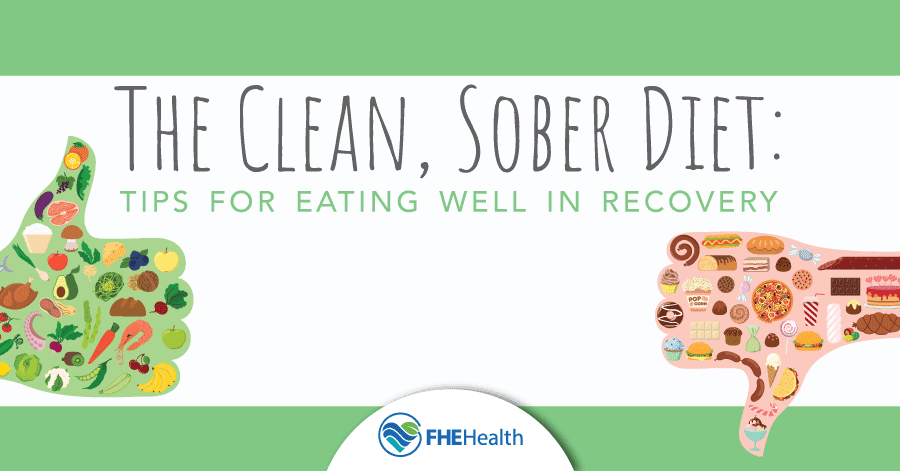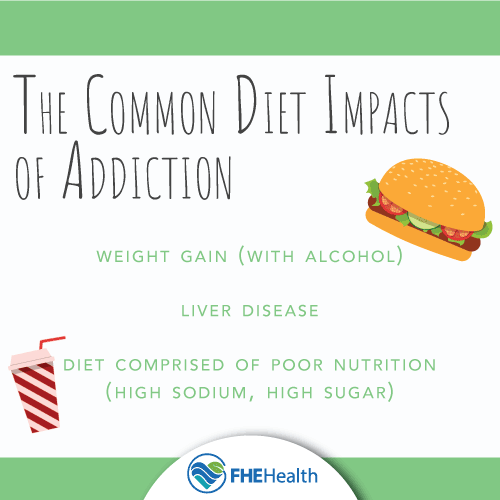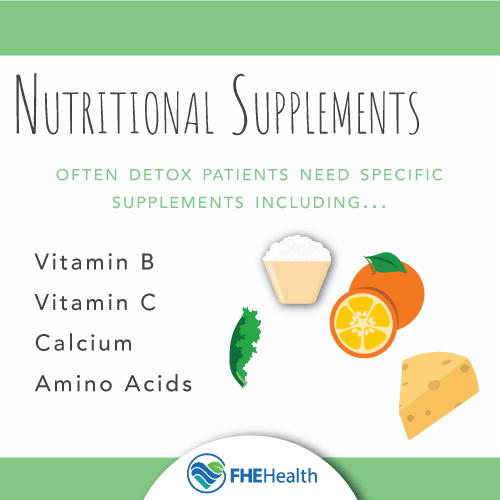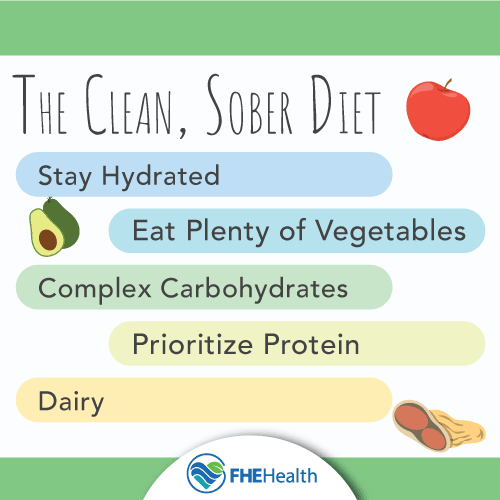
A healthy diet is important for everything from maintaining a normal weight to preventing elevated risks of things like stroke and heart disease. Significant scientific research goes into determining the effects of different foods on the human body, with general conclusions pointing to natural whole foods as the best option. For those hoping to maintain health in sobriety, particularly after months or years of abusive behavior, eating right is an essential part of the equation.
FHE is dedicated to making a difference for those seeking a healthier, happier way of life, regardless of circumstance. With a focus on eating well in recovery and the right sober diet, it’s possible to improve recovery efforts by working to undo the damage drugs and alcohol can do to the body.
How Diet Suffers in Active Addiction
 An addiction to drugs or alcohol often comes on slow, starting as a complement to normal activities. Users may start out taking pain pills to address pain from an accident or injury while still maintaining a normal life or drinking socially with friends. Over time, the importance of substances comes to outweigh the importance of things like getting exercise and eating right. As addiction escalates, regular meals fall by the wayside, with home cooking and healthy choices replaced by fast food, soda and fattening snacks.
An addiction to drugs or alcohol often comes on slow, starting as a complement to normal activities. Users may start out taking pain pills to address pain from an accident or injury while still maintaining a normal life or drinking socially with friends. Over time, the importance of substances comes to outweigh the importance of things like getting exercise and eating right. As addiction escalates, regular meals fall by the wayside, with home cooking and healthy choices replaced by fast food, soda and fattening snacks.
How diet is affected can vary from one substance to another. For those addicted to alcohol, a large portion of caloric intake comes from alcohol, not fruits, vegetables and protein, leading to weight gain and obesity. In some cases, scurvy can develop in those who truly ignore fruit and vegetable requirements, leading to serious health concerns outside of standard risks, like liver disease.
The same can be true for those who are addicted to opiates, for example. Those with a serious issue who spend most of the day injecting heroin or taking pills may stop prioritizing food, leading to weight loss and the emaciated appearance often associated with meth and opiate use. Marijuana use, on the other hand, can contribute to a conditional colloquially referred to as the munchies, or a deep desire for snack food that results in overeating fast food, chips and candy.
Nutritional Supplements During Detox
 The first stage in rehabilitation, detoxification is a five- to seven-day program intended to help individuals with a substance use disorder to overcome the initial symptoms of physical withdrawal. Detox can be an extremely stressful period of time for those working to overcome addiction and is often an uncomfortable process. However, putting a focus on achieving proper nutritional intake as well as managing symptoms can provide a better foundation upon which to continue on to inpatient treatment.
The first stage in rehabilitation, detoxification is a five- to seven-day program intended to help individuals with a substance use disorder to overcome the initial symptoms of physical withdrawal. Detox can be an extremely stressful period of time for those working to overcome addiction and is often an uncomfortable process. However, putting a focus on achieving proper nutritional intake as well as managing symptoms can provide a better foundation upon which to continue on to inpatient treatment.
Vitamins and minerals can’t necessarily help you flush out harmful substances in the body — your kidneys do this naturally for you — but they can go a long way in remedying the nutritional deficiencies that often affect those in active addiction. As such, recovering substance users in detox are encouraged to take appropriate doses of supplements like:
- Vitamin B: One of the most essential groups of vitamins for healthy living, B vitamins are critical in helping the body convert sugar into energy as well as encouraging blood cell production. However, substance abuse can affect vitamin absorption, leaving these functions underserved. A good multivitamin can address most common B vitamins, including B2, B6 and folic acid.
- Vitamin C: Vitamin C can boost the immune system and increase energy, two benefits that can assist addicts overcoming addiction. Additional vitamin C can help minimize symptoms like depression or fatigue, making withdrawal a little easier to bear.
- Calcium: Calcium plays a primary role in keeping bones strong. Unfortunately, heavy alcohol consumption can compromise calcium absorption, putting female alcoholics in particular at risk for osteoporosis. Taking calcium can help mitigate this risk, helping those in recovery to make up for lost time.
- Amino Acids: Amino acids are the building blocks of protein and play an important part in the production of both hormones and neurotransmitters, as well as improving mood. Most people get enough essential amino acids through the course of protein consumption, but those who aren’t eating proper protein levels due to addiction may be at risk for nutritional deficiencies. Accordingly, amino acids are regularly encouraged for those in detox.
It’s important to understand that to some degree, taking vitamins is a personal process. The medical professionals overseeing your treatment can help you identify which supplements are ideal for your drug or alcohol detox diet.
A Sober Diet
 As you learn to embrace sobriety, a healthy diet should be a priority in your life. It’s far too easy for some recovering substance users to attempt to use food as a reward for staying sober, which results in continued poor habits rather than the kinds of lifestyle changes needed to maintain lasting sobriety. As compelling as it is to attempt to use sweets and snack food to fill the void left behind by drugs or alcohol, use this life change to shift all of your habits — not just the ones related to substance abuse. When planning your diet both in rehabilitation as well as when you are living independently, keep these tips for a sober diet in mind.
As you learn to embrace sobriety, a healthy diet should be a priority in your life. It’s far too easy for some recovering substance users to attempt to use food as a reward for staying sober, which results in continued poor habits rather than the kinds of lifestyle changes needed to maintain lasting sobriety. As compelling as it is to attempt to use sweets and snack food to fill the void left behind by drugs or alcohol, use this life change to shift all of your habits — not just the ones related to substance abuse. When planning your diet both in rehabilitation as well as when you are living independently, keep these tips for a sober diet in mind.
Stay Hydrated
Hydration is important for everyone, regardless of history of substance abuse. Even if water hasn’t been a big part of your life before, make sure it is now. Shoot for eight 8-ounce glasses a day. Flavor packets or flavored seltzer water can make this easier for those adjusting to increased intake or who don’t yet have a taste for water.
Eat Plenty of Vegetables
Vegetables are packed with critical vitamins and nutrients, so getting plenty of leafy greens is always encouraged. Vegetables don’t have to be boring — with sauces, dressings and creative preparation methods like roasting, you can turn what seems like something bland and boring into a delicious meal.
Focus on Complex Carbohydrates
Carbs are a big part of providing your body with energy, but it’s far easier to eat empty carbs than more nutritionally beneficial complex carbs. Instead of buying food items like white bread, which is generally a poor nutritional choice, pick whole wheat products and include healthier options like brown rice and quinoa in addition to more traditional items like potatoes.
Prioritize Protein
A great source of amino acids and a necessary component to keep the body strong, protein is a must-have. Lean meats and poultry are great sources for those who choose to eat meat, but for those who don’t or would prefer to limit intake, nuts, seeds and tofu can be excellent substitutes.
Dairy
Dairy products are good sources of both calcium and vitamin A, promoting strong, healthy bones and teeth as well as healthy digestion. Dairy products can be high in fat, but skim milk, yogurt, butter and some cheeses can be a good way to supplement your diet.
Diet and Relapse
In a perfect world, a good diet could prevent relapse, but this unfortunately isn’t true. There’s no one way to prevent relapse and, sadly, around 40 to 60 percent of recovering substance users will relapse at least once before finally getting clean.
However, the realities of drug addiction don’t necessarily mean that a good diet won’t help. Eating right is part of overall wellness, and an alcohol recovery diet, for instance, can help those working to overcome addiction to feel better on the whole. A poor diet can result in stomach pain, headaches, weakness, fatigue and lethargy, creating an unwell feeling that those in recovery may attempt to remedy with substance use. A healthy diet, on the other hand, can provide energy, clear-headed thinking, motivation and an overall feeling of wellness. Those who eat right are also more likely to exercise regularly — a tactic many people use to overcome addiction, replacing substance use with the high of physical activity.
Addiction is always a dangerous situation, regardless of diet. However, the effects of a poor diet can only exacerbate the problem, adding to health risks and furthering a downward spiral. Proper health and wellness can offset the risks of ongoing substance use, encouraging overall wellness and a healthier perspective on life. If you or someone you love is working through addiction, FHE can help, from detox to alumni programming. With a focus on proper supplementation and nutrition, we can support you on your journey to getting well.






